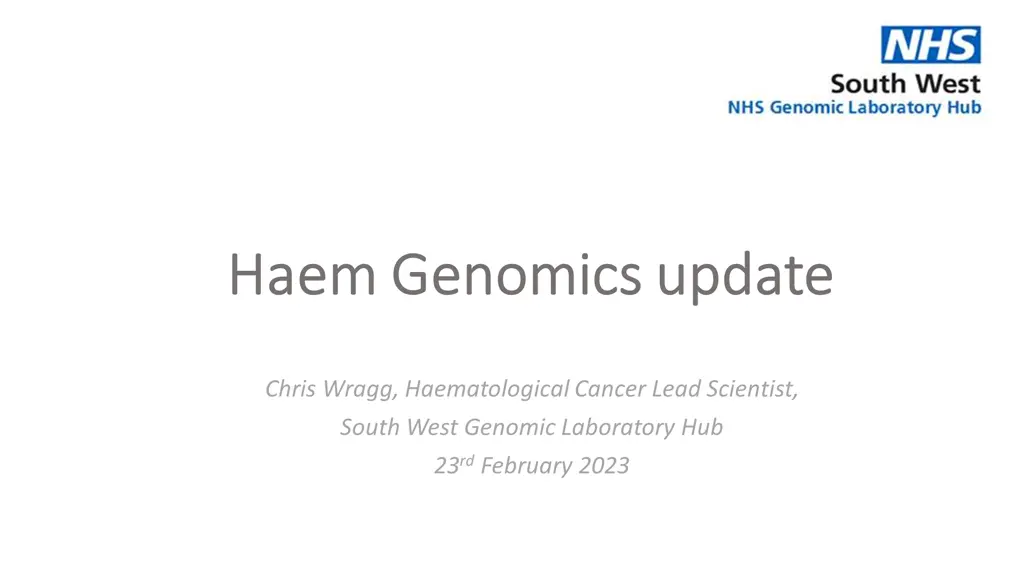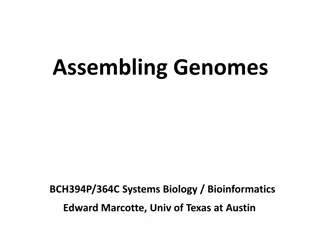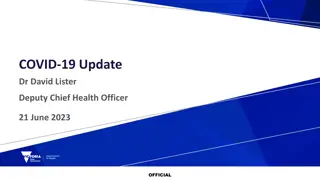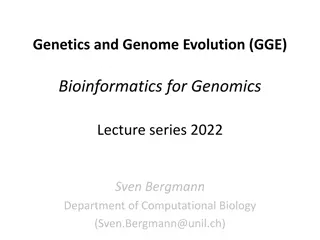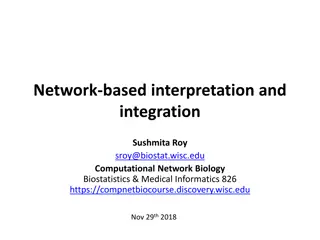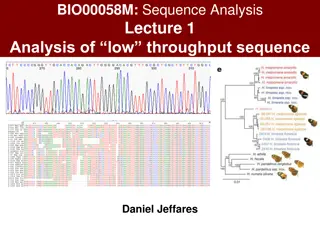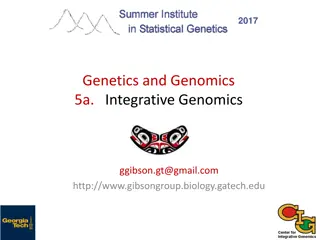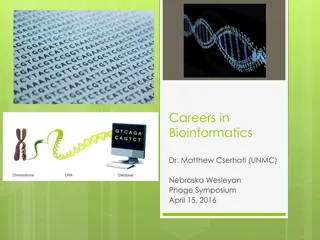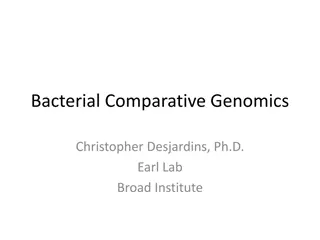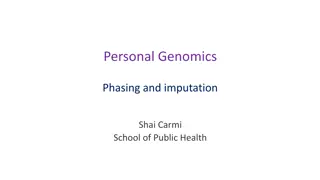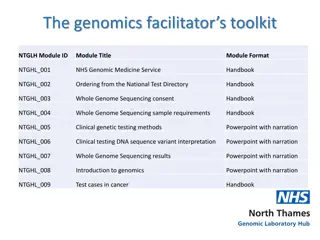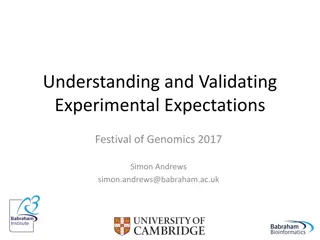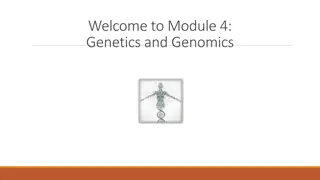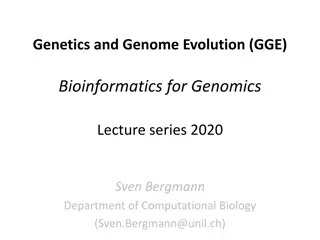Haem Genomics update
Stay updated on the latest advancements in Haem Genomics and Germline Findings. Learn about changes in MPN Panel testing and Genomics TATs. Explore the benefits and improvements in SNP Array testing.
Download Presentation

Please find below an Image/Link to download the presentation.
The content on the website is provided AS IS for your information and personal use only. It may not be sold, licensed, or shared on other websites without obtaining consent from the author.If you encounter any issues during the download, it is possible that the publisher has removed the file from their server.
You are allowed to download the files provided on this website for personal or commercial use, subject to the condition that they are used lawfully. All files are the property of their respective owners.
The content on the website is provided AS IS for your information and personal use only. It may not be sold, licensed, or shared on other websites without obtaining consent from the author.
E N D
Presentation Transcript
Haem Genomics update Haem Genomics update Chris Wragg, Haematological Cancer Lead Scientist, South West Genomic Laboratory Hub 23rdFebruary 2023
Haem Genomics update Haem germline findings NGS testing for MPN TATs SNP arrays WGS 2
Haem Germline Findings A number of the genes included in haem NGS panels for their somatic actionability are also cancer susceptibility genes (CSGs) in the germline setting e.g. CEBPA, RUNX1, DDX41 It is not possible to determine whether variants identified by NGS of a somatic sample (e.g. bone marrow) are of tumour or germline origin, although type and abundance of variant can be informative In lieu of national guidance, we have written a guidance document to support laboratory staff and clinicians Possible inherited variant cases can be discussed at the Regional Acute Leukaemia Advisory Panel (RALAP) which has multidisciplinary input including Clinical Geneticists. Please email rduh.regionalacuteleukaemia@nhs.net or thomas.coats@nhs.net for more details 3
MPN Panel testing We will be changing the way that we perform testing for MPN All samples that require sequential MPN testing (CALR/JAK2 Exon 12/MPL) will be tested on a mini NGS panel : Mini-MPN panel is a virtual panel restricted to CALR/JAK2 exon 12/exon 14 and MPL genes. ddPCR for JAK2 V617F will continue to be the first line analysis, the panel will only be applied if sequential testing is indicated If an extended MPN panel is required please indicate on the referral form Benefits to the change include: Streamlining of services - one assay rather than multiple assays for sequential testing Reduced turn around times Clarification of CALR variant type [type 1/2] Option to request re-analysis of data for extended analysis Discussed at the supra-regional MPN MDT on 31stJan 2023 Implemented from 6thFebruary 2023 4
Genomics TATs In order to improve visibility of our cancer turnaround times (TATs) we are improving information available on the SW GLH website SWGLH Quality | North Bristol NHS Trust (nbt.nhs.uk). 5
SNP Array: SW GLH Overview Launched for A2G trial January 2021 (inc. T-ALL for MRD target ID) Expanded to include: Adult ALL Cases where conventional cytogenetic analysis has failed Characterisation of results from other tests Fresh frozen pathways for brain tumour referrals Reviewing testing strategy in MDS and MPN: Increase in demand for cytogenetic analysis in MDS Highly skilled and manual process, significant training requirements Current mandated scientist training program has limited cytogenetic component Shortage skill set with ageing workforce and high turnover in junior grades 2/7 GLHs have moved from cytogenetic analysis to SNP-A testing in low risk MDS BSH MPN guidance also supports use of SNP-A in ET/PMF instead of karyotype 6
SNP microarray Implemented January 2021 Genome wide, high resolution copy number: Gain Loss Genome wide high resolution genotyping: BB AB AA 7
SNP-A in MDS SNP array and karyotype will both detect unbalanced abnormalities i.e. deletions and gains SNP array will detect sub-microscopic changes and cytogenetically cryptic changes e.g. deletion/LOH for TP53 SNP array will not detect balanced abnormalities IPSS based upon conventional karyotype Where sufficient sample is available for DNA extraction SNP-A success rate is 100% Audit from 20 paired analyses (Karyotype and SNP array): 15/20 concordant (although SNP provides more granular detail was not prognostic) 2/5 discordant cases SNP showed additional prognostic abnormalities 3/5 discordant cases karyotype showed additional prognostic abnormalities These were high risk MDS cases and would have received karyotype Cell culture seems to enrich for the abnormal clone, notably for trisomy 8 SNP-A a suitable replacement for conventional cytogenetic analysis in low risk MDS 9
Cancer Whole Genome Sequencing (WGS) Exhausted SoC testing or treatments Aligned to Clinical Trials 1. Somatic (fresh) sample; [>30% tumour, <20% necrosis] 2. Germline sample [cultured skin] 3. WGS Test Order Form (TOF) 4. Record of Discussion (RoD) Phase 1 Childhood Cancer ( 19 years of age) Acute leukaemia (AML, ALL, ALAL, BPDCN) Sarcoma Phase 2/3 Paediatric cancer ( 25 years of age) Proven or suspected malignancy exhausted all standard of care (SoC) testing and treatment Malignant CNS tumours Breast and ovarian cancer pilots
Any questions? Chris Wragg Christopher.wragg@nbt.nhs.uk 0117 414 6141 11
